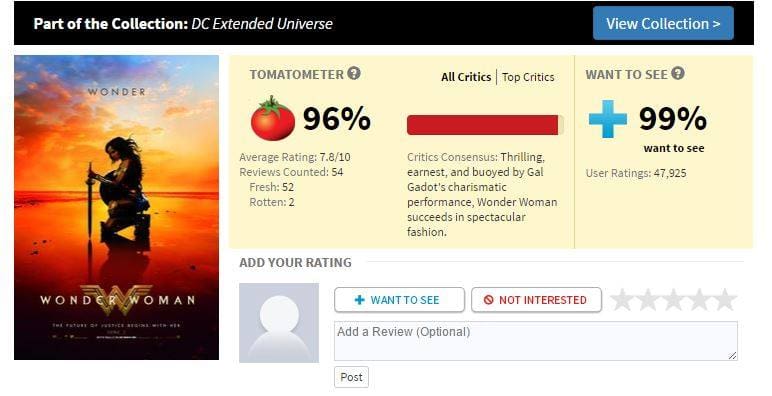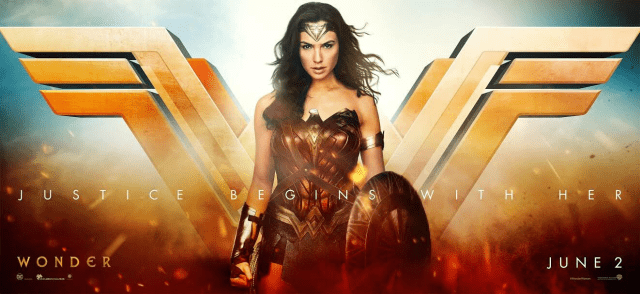Wonder Woman Looks Super, But There Are Reasons to Worry
Like many people, I’ve come away from the trailers for the upcoming Wonder Woman movie with a great deal of optimism. The extremely positive and absolutely glowing reviews the film has received so far also give me hope that the movie will do justice to the world’s most famous superheroine and set the much-maligned DC Extended Universe (DCEU) on the right track. Despite the early praise Wonder Woman is receiving from critics, though, I do have some pretty significant concerns about the movie’s quality and financial success. Even if the movie continues to succeed critically, Wonder Woman will still have major obstacles to hurdle because of the film’s historical and cultural context.
Marketing
Whenever a new comic book movie comes out, one of the first things that I notice is how the film is marketed and what sponsorship deals the studio makes to promote the film. Take Batman v Superman: Dawn of Justice as an example: when that film came out, Warner Bros. made several partnerships with car companies, Dr. Pepper, Doritos, and General Mills cereals. On top of those deals, WB also created a ton of promotional videos and toys. Marvel Studios has similarly worked with junk food and fast food companies to advertise films and create tie-in products.
What companies, you ask, have the makers of Wonder Woman teamed up with? Dr. Pepper, Barbie dolls, and a line of Wonder Woman branded Think Thin protein bars. I’ll let that sink in for a moment. Not only is that a miniscule amount of sponsorships (one of which represents a running deal already made by WB), these partnerships represent a truly mind-numbing sexist double standard. What kind of message does it send when a film featuring male superheroes is promoted by fattening junk food but a movie starring a female hero is advertised via diet bars that are literally called Think Thin? Does that mean women can only be heroic if they’re thin and watch their weight but men can eat whatever they want? Keep in mind that Ben Affleck and Henry Cavill are both incredibly ripped, yet WB didn’t partner with protein bars or powder designed to build muscle. This double standard sends a terrible message.
On top of that deeply flawed subtext, the low number of partnerships and the relatively low amount of advertisements on television and online (compared to movies like Guardians of the Galaxy Vol. 2) suggest that WB is not setting up Wonder Woman for financial success. As they say in the marketing business, you have to spend money to make money, and the producers and executives don’t seem to be adhering to this principle. Unless WB steps up their advertisements and the film receives good word-of-mouth (in addition to the positive reviews its already garnered), getting potential viewers into theater seats could be a challenge.
Film History and Behind the Scenes
As the first comic book movie starring a female protagonist in either the DCEU or the MCU, there is a lot of pressure on Wonder Woman to succeed. True, this film won’t be the first movie with a superheroine in the lead role, but consider what its predecessors are: Helen Slater’s Supergirl (1984), Halle Berry’s Catwoman (2004), and Jennifer Garner’s Elektra (2005). All three of these motion pictures were incredible financial and critical failures, with none of them scoring a Rotten Tomatoes score above 10% and only one of them making more money than it cost. That sample size is admittedly small but not a source of optimism.
For whatever reason, Hollywood has thus far been incapable of producing a successful superheroine film. Making a good action or comic book movie with a female lead shouldn’t be that difficult in theory, but critics and audiences too often respond with shock when a film produces a strong female character. Sigourney Weaver’s groundbreaking performance as Ripley in Alien occurred thirty-eight years ago, but Mad Max: Fury Road’s Imperator Furiosa (Charlize Theron) is still unfortunately the exception rather than the rule in action movies. For Wonder Woman to resonate with audiences, Gal Gadot’s Princess Diana must follow in the footsteps of those aforementioned heroines.
One reason to hope that Wonder Woman will surpass its comic book predecessors is that an accomplished female director, Patty Jenkins, is behind the camera. Having more women and minorities involved in filmmaking is always important, and their voices are especially important when the movies they make star female and minority characters. Unfortunately, as important as the role of director is, Jenkins is one of the few women with creative control over the film. Only one of the producers is a woman (Deborah Snyder, whose husband is overseeing the DCEU), all of individuals given story credits are male, and the sole screenwriter is a man (though he is openly gay). The limited female influence behind the scenes is not a sure sign the film will fail to depict Wonder Woman in an appropriately feminist light, but the gender ratio is certainly a cause for concern.
Complicated History On and Off the Page
While audiences have seen Batman and Superman’s origin stories multiple times over the years, this film represents the first time that Wonder Woman’s beginnings will grace the silver screen. Even outside of theaters, most of the public can probably tell you that Superman is an alien from a doomed planet and Batman is a billionaire orphan. Wonder Woman thus has to establish an origin that is not widely known by individuals unfamiliar with comic books. What complicates this task even further is just how complex Wonder Woman (aka Princess Diana aka Diana Prince) is; unlike the Man of Steel and Dark Knight, Wonder Woman’s history has changed several times over the years, leaving the filmmakers some significant decisions to make.
Wonder Woman’s status as an Amazon may be consistent, but the circumstances of her birth include her being a normal Amazon, a human sculpted from clay brought to life, and the demigoddess daughter of Zeus and Hippolyta. All of these origins are more complicated than her male counterparts’, and the filmmakers will have to find a way to capture that complexity in a way that both honors the character’s history and makes sense to casual moviegoers.
Likewise, Wonder Woman’s creation in the real world is a bit more nuanced than the two male members of DC’s trinity. Whereas Superman was created by two Jewish immigrants in Ohio and gradually became associated with “truth, justice, and the American Way,” psychologist William Moulton Marston formulated Wonder Woman as the ideal woman. As discussed in Jill Lepore’s The Secret History of Wonder Woman, the character was conceptualized as someone who could rule the world with love and weaponize honesty in her battles against evildoers.
More surprising, though, was Marston’s emphasis on bondage and submission, as seen in Wonder Woman’s use of her Lasso of Truth and the fact that her primary weakness is being bound or tied up by a man. Marston intended to use these elements as a means to defend submission as a healthy behavior in relationships, but the sexual implications of these ideas may raise some eyebrows.
Although the filmmakers don’t need to acknowledge this portion of the character’s history, they will need to be careful if they include Wonder Woman’s traditional weakness in the movie. Moreover, including some of these elements may be a useful way of differentiating Wonder Woman from other badass heroines and would show respect for her history, but significant thought would need to be put into their execution.
Public Perception (and Double Standards)
When Gal Gadot was first cast as Wonder Woman, I remember seeing numerous arguments online if she was right for the role. Such scrutiny and backlash is not uncommon for comic book films (remember all of the jokes that were made when Ben Affleck was cast as Batman?), but the conversations around Gadot felt much harsher and stuck on her appearance.
While Affleck was mocked largely because of his inclusion in 2003’s Daredevil, Gadot received a large amount of criticism because of her physique; commenters argued that she was too thin, that she wasn’t muscular enough, that she wasn’t busty enough. Such body policing not only represents a double standard but also a societal issue the film will need to combat. Additionally, these early debates raise the question of what Wonder Woman represents.
As reported in The New York Times and other news sources, the United Nations officially named the fictional character of Wonder Woman as an UN Honorary Ambassador for the Empowerment of Women and Girls last October. However, only two months later, the UN ended the ambassadorship because of protests that Wonder Woman’s curvy figure and revealing attire made the character a poor representative of gender equality. This controversy highlights the conflicting roles the superheroine has filled over the years. What does it mean if a character is both a feminist icon and a sex symbol, a liberated female character and an object for the heterosexual male gaze?
Perhaps more than any other concern, the most important challenge Wonder Woman faces is resolving this discrepancy. If the filmmakers truly intend to represent the movie’s titular character as a symbol of empowerment for girls and women, the film will need to provide a clear, consistent representation of Diana. The movie needs to make a conscious decision to reject the objectification the character has experienced over the years and embrace her political, social, and cultural relevance.
As one of the first and most popular superheroines in American pop culture, Wonder Woman needs to be presented as more than just a female warrior, a portrait painted by some of the movie’s promotional material.
To truly succeed, Wonder Woman will need more than strong reviews from critics; the film needs to honor the female audiences that have looked up to the character for generations and inspire a new generation of girls and women to follow the legend’s example. I’m hopeful the movie can accomplish this task, but there are still plenty of reasons to worry and question the early reviews.



